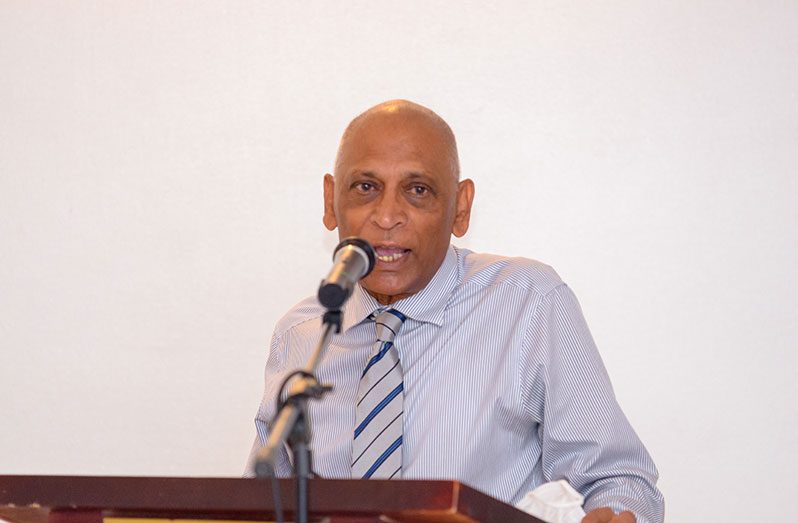THE Guyana Country Coordinating Mechanism (GCCM), on Tuesday, began its two-day workshop in collaboration with the Ministry of Health (MoH) to develop an advocacy plan which focuses on removing barriers faced by men who have sex with men and transgender women when accessing human immunodeficiency virus (HIV) services.
Other collaborators include the National AIDS Programme Secretariat, Merundoi Inc., Guyana Trans United, and Proud to be Trans, with funding from Community Rights and Gender and The Global Fund to Fight AIDS, Tuberculosis, and Malaria.
Speaking at the workshop, Adviser to the Minister of Health, Dr. Leslie Ramsammy said that it was disappointing that yet another workshop had to be held to develop an advocacy plan.
“Science said that the best response to a public health crisis is punitive measures. Science then said, hide those who have a public health problem… when, unfortunately, dozens of countries today continue to maintain that scientific approach,” Dr. Ramsammy said.
He added that it was time that the policies, laws, and strategies were aligned with the more profound up-to-date ones.
“In keeping with the new science that we have, new science is only as good as our willingness to use it…I want to, once again, commit the Ministry of Health and the Government of Guyana, to the 2030 goals of 95-95-95,” he related.
The 95-95-95 goal aims for 95 per cent of those living with HIV to know their status, 95 per cent of those who know their status to be on treatment, and 95 per cent of those on treatment to be virally suppressed, according to Aidsmap.
Colin Blaize, Monitoring and Evaluation Officer, Guyana Trans United, and member of the GCCM, said that the workshop will continue on a path which had started a decade ago when transgender women were marginalised. He said that many of them were engaged in sex work because they were not given the same employment opportunities being enjoyed by heterosexual persons.
“As I recall, many of us embraced this profound profession of sex work not thinking we were putting ourselves at risk of contracting HIV and other STIs,” Blaize said.
Blaize said that many are stigmatised and discriminated against because they are comfortable with being who they are.
Blaize added: “Often, we were faced with these barriers when visiting health facilities to access healthcare services and, because of these barriers, members of this vulnerable population opted to not access the services or default due to the fact they are not comfortable [with] the way they are treated.”
Additionally, with the intervention of the MoH and donor funding over the years, many changes have been made as healthcare workers were educated on gender identity.
“However, with the recent passage and removal of the cross-dressing law from our books and all the work done so far, we are still faced with institutional policy, buggery law, and religious interference which most times seem like a tool to prohibit the government of the day from treating us equal,” Blaize explained.
Blaize applauded Global Fund and all the parties involved in the process of change and expressed hope that the plan would not be another document that is left to garner dust on someone’s bookshelf but that it will be implemented to ensure life is better for transgender persons and other members of the LGBTIQ+ community.



.jpg)








